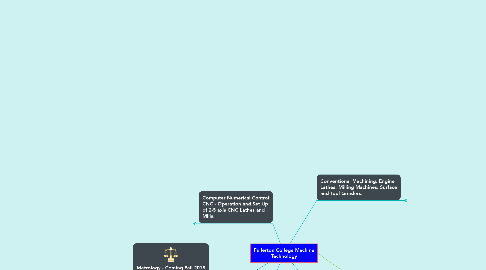Fullerton College Machine Technology
af Dan O'Brien

1. Computer Numerical Control CNC - Operation and Set Up of 2-5 axis CNC Lathes and Mills.
1.1. Machine 86
1.1.1. CNC Set Up & Operation - 3 units
1.2. Machine 88
1.2.1. Adv CNC Set Up & Operation - 3 units
1.3. Machine 90
1.3.1. Multi Axis CNC Set Up & Operation - 3 units
1.4. 5 Axis CNC Swiss Machining Courses Fall 2018
2. Metrology - Coming Fall 2018 Learn about PCDMIS Software, Coordinate Measuring Machines, Laser Scanning and Romer Arms.
3. Degree & Certificates
3.1. Associates in Science in Manufacturing
3.2. Machinist Level I
3.3. Machinist Level II
3.4. CNC Operator
3.5. CNC Machinist
3.6. Mastercam
3.7. Surfcam
3.8. Metrology Fall 2018
3.9. CNC Swiss Fall 2018
4. Conventional Machining, Engine Lathes, Milling Machines, Surface and Tool Grinders.
4.1. Machine 91
4.1.1. Introduction to Machine Tools - 5 units
4.2. Machine 92
4.2.1. Intermediate Machine Tools - 5 units
4.3. Machine 93
4.3.1. Advanced Machine Tools - 5 units
5. CNC Programming, G&M Code, Mastercam, Surfcam, Conversational Programming.
5.1. Machine 87
5.1.1. CNC Manual Programming - 3 units
5.2. Machine 50
5.2.1. Beginning Mastercam - 3 units
5.3. Machine 52
5.3.1. Advanced Mastercam - 3 units
5.4. Machine 60
5.4.1. Beginning Surfcam - 3 units
5.5. Machine 62
5.5.1. Advanced Surfcam - 3 units
5.6. Conversational Programming - Future Program & Course Development
6. Integrating Social Media with Learning Excercises
6.1. My Gateway, FC Campus Content Management System
6.2. Canvas, New FC Campus Learning Managment System
6.3. Facebook Groups
6.4. YouTube
7. Adult Learning Theories
7.1. Cognitive - The focus on what is happening to learners internally that provides conditions for learners to acquire strategies to improve performance (Beich, 2008).
7.2. Constructivism - Learners utilize prior knowledge and experiences to construct meaning that will apply to current, relevant problems (Merriam, 2014).
7.3. Behaviorist - Observable learner behavior determined by the environmental stimuli, behavioral responses and outcomes (Razik, 2010).
8. Relavant Training Competencies Related to Social Media
8.1. Social media combines all three adult learning theories by utilizing the collaboration of the learners.
8.2. Behavior is observed as appropriate or innapropriate by the learners and course facilitators.
8.3. Learner participation is reinforced by other learners participating in discussions.
8.4. The cognitive domain is the internal reactions of the learners which promotes learning.
8.5. Constructivism allows learners to utilize past experiences and the experiences of others to create meaning during learning exercises.
8.6. Social constructivism is formed when collaboration leads to learners learning from the experiences of others.
9. Social Media and e-learning Student Motivation
9.1. Learners reinforce learning activities and comprehension by comparing progress with others.
9.2. Learners can share best practices with other learners who are struggling with course materials.
9.3. Students are motivated by their accomplishments and achievements.
9.4. Students show further confiidence by helping others succeed with their assignments.
10. Ethical Considerations of Integrating Social Media
10.1. Liability concerns - Users of social media are still held to the same rules of protection of copyrights, brands and intellectual property as if it were printed media.
10.2. Proper credit and citations to the creator of content is required in all cases. Written permission is requried of copyrighted materials.
10.3. Social Media sites are not responsible for the upload of copyrighted or protected materials according to the Digital Millennium Copyright Act, DMCA (Beich, 2008).
11. Relevant Training Program Competencies & Social Media
11.1. Computer competency and internet navigation basic skills are are required of learners.
11.2. Learners need to know how to recieve messages and contribute to discussion posts.
11.3. Learners need to know how to upload and download documents and images.
12. References
12.1. Biech, E. (Ed.). (2008). ASTD handbook for workplace learning professionals. Alexandria, VA: ASTD.
12.2. Caffarella, R. S., & Ratcliff Daffron, S. (2013). Planning programs for adult learners: A practical guide (3rd ed.). San Francisco, CA: Jossey-Bass.
12.3. Merriam S. B., Bierema L.L. (2014) Adult learning linking theory and practice. San Francisco CA Jossey-Bass.
12.4. Mindmeister (2017). [Illustration of graduate hat and tassel]. Retrieved from https://www.mindmeister.com
12.5. Mindmeister (2017). [Illustration of measuring scale]. Retrieved from https://www.mindmeister.com
12.6. Mindmeister (2017). [Illustration of @ sign]. Retrieved from https://www.mindmeister.com
12.7. Mindmeister (2017). [Illustration of a pencil]. Retrieved from https://www.mindmeister.com
12.8. Razik, T. A., & Swanson, A. D. (2010). Fundamental concepts of educational leadership and management (3rd ed.). Boston, MA: Pearson.


